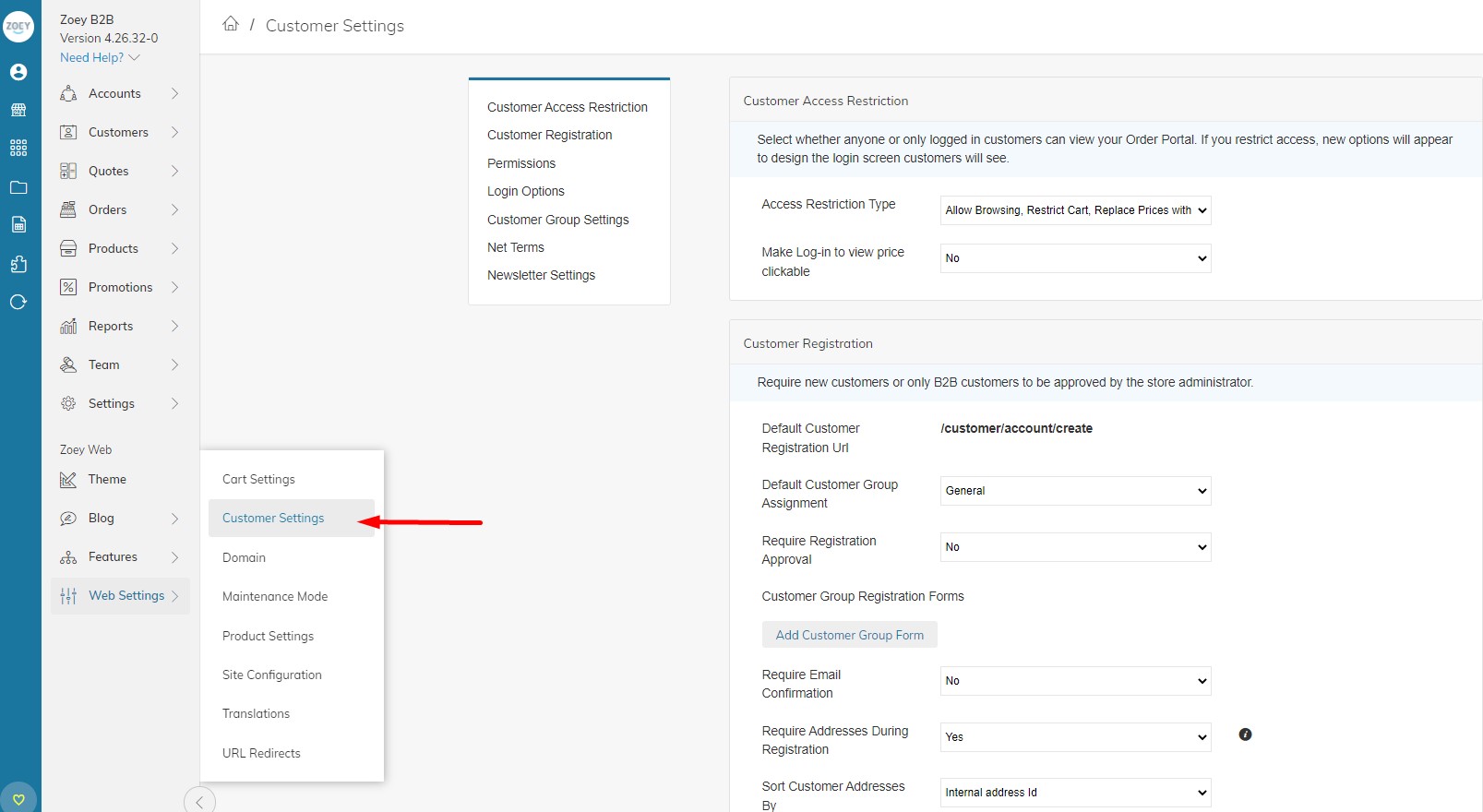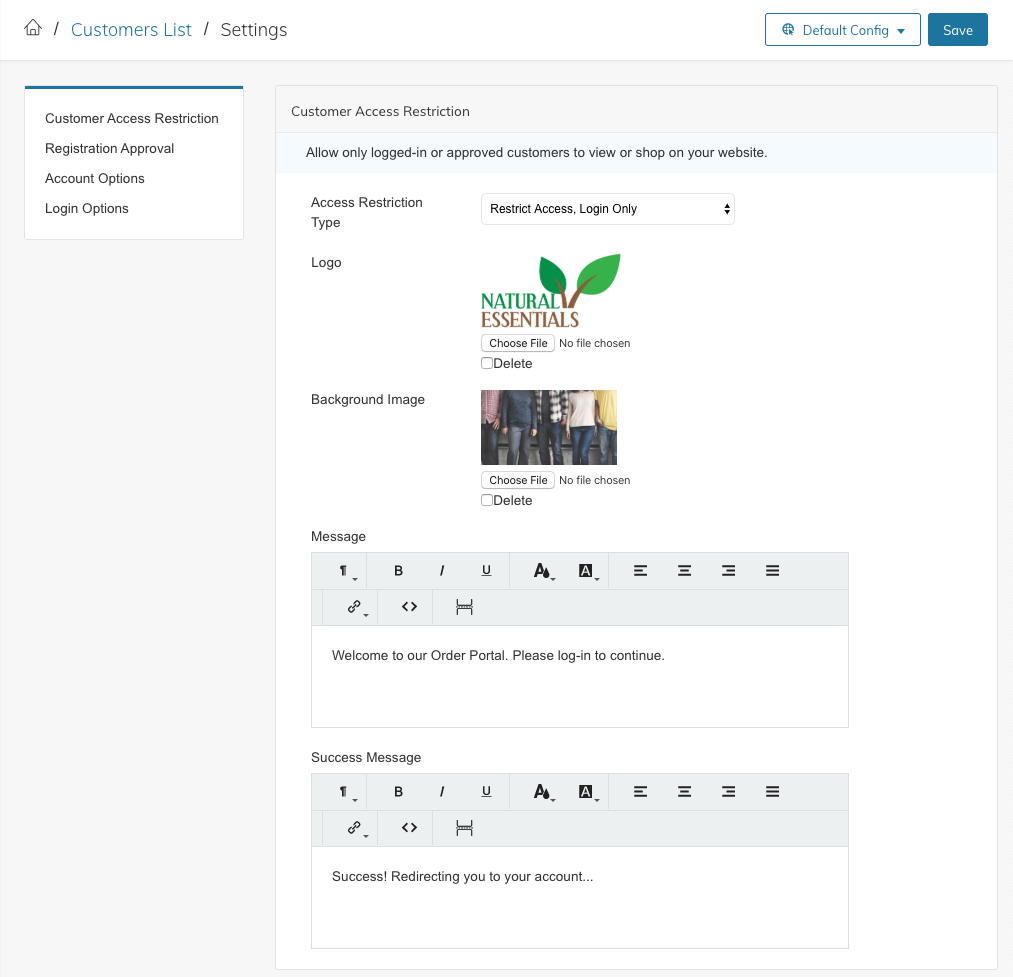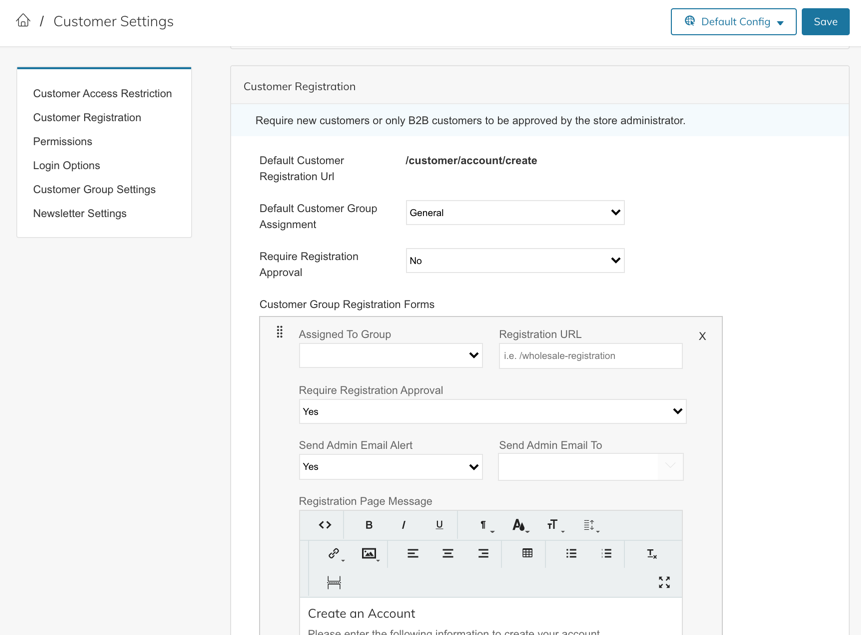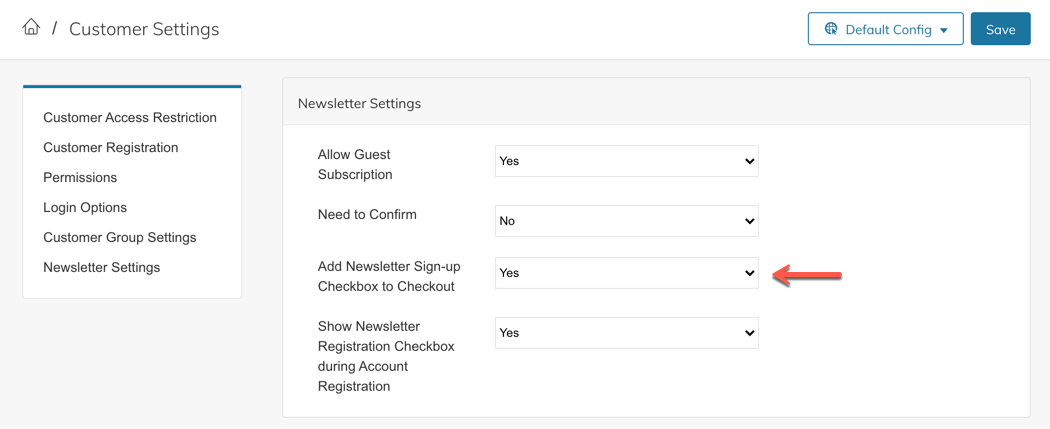Customer Settings
Located in Web Settings > Customer Settings

Customer Access Restriction
Initially set to "Public" meaning anyone can access your website, Customer Access Restrictions allow you to set only logged-in or approved customers to view or shop on your website.

Access Restriction Type
Specify if your website will be Public or Restricted by one of the rules in this drop-down setting.
Logo
If you restrict your website to login or login/register, this setting allows you to upload a custom logo that will be used on the login screen.
Background Image
If you restrict your website to login or login/register, this setting allows you to upload a custom background image that will be used on the login screen.
Message
If you restrict your website to login or login/register, this message will appear below the logo and above the login form
Success Message
If you restrict your website to login or login/register, this message will appear after a user has successfully signed in.
Customer Registration
Require new customers or only specific customers to be approved by the store administrator.

Require Registration
YES or NO - if registration is required, you can specify if you want it required for all customers, or only specific customers registering through a custom URL (see "Require Approval For" setting)
Send Email Alert for Pending Registrations
Yes or No - Configure email settings for registration approval in Setup > Emails
Require Approval For
Select All Customers, or specific customers logging in at a custom URL (Provided below)
Default Group
This will be the Customer Group assigned to the customers registering at the Custom URL below:
Registration Page URL
This is the custom URL the specific customers will need to use to register. They will then be a assigned the "Default Group"
Registration Page Message
This message will appear on the custom registration form.
Require Email Confirmation
Yes/No - this setting specifies if the user will need to confirm their email address (using a confirmation link sent to them after registering) before they can log-in.
Permissions
Allow Customers to Add Addresses
When set to Yes customers will be able to add new addresses to their address book. If set to No and no addresses exist the customer will be unable to checkout. Guest Checkout will still allow users to enter any address. You can disable Guest Checkout under Setup->Checkout Settings
Allow Customers to Edit Addresses
When set to Yes customers will be able to edit existing addresses in their address book
Allow Customers to Delete Addresses
When set to Yes customers will be able to delete existing addresses in their address book
Sort Customer Addresses By
Sort customer addresses in the order they were entered, or alphabetically by Name, Company, Street, City, State etc...
Number of Lines in a Street Address
Leave empty for default (2). Valid range: 1-4
Show Newsletter Registration Checkbox during Account Creation
Yes or No.
Require Addresses During Registration
If enabled, address will be assigned as the Default Billing and Default Shipping address for the customer.
Login Options
Redirect Customer to Account Dashboard after Logging in
Yes or No - Customer will stay on the current page if "No" is selected.
Customer Group Settings
Restrict Customer Groups to Specific Languages & Currencies
Yes or No - If using multi-language or multi-currency, you may restrict Customer Groups to specified language and currency.
Enable Group Specific Sales Increment IDs
Yes or No - Setting to YES will allow you to configure custom Order, Invoice, Credit Memo or Shipment ID numbers for users assigned to this customer group.
Net Terms
Disable Net Terms When Orders are Past Due
Yes or No - Setting to Yes will give you a Past Due Day Limit option in which Net Terms will not be available to the Customer. They will have to select a Payment Method at checkout.
Prevent All Orders From Past Due Accounts
When the above setting is set to Yes, Customers with past due orders will not be allowed to place new orders until the past due Invoices are paid.
Past Due Day Limit
Enter the number of days past the net terms days to consider the Invoice past due.
Begin Net X days after Shipping
Yes or No - When set to Yes, orders will be placed in "Pending Shipment" state and the due dates will be calculated from the date of the order's first shipment.
Hold Credit on All Open Orders
Yes or No - When set to No, Credit will be held only for Orders that have been Shipped.
Default Customer Net Terms Details and Default Account Net Terms Details
This is the Term Detail text displayed in the Checkout.
Newsletter Settings

This will then display a checkbox that allows users to sign-up for your newsletter when they checkout on the last step before submitting the order. Email addresses will be added to Customers>Subscribers and can be synchronized with 3rd party services such as MailChimp, Constant Contact and so forth.
Please note in accordance with anti-spam regulations, this checkbox cannot be preselected by default. The user must check it off.
Updated 10 months ago